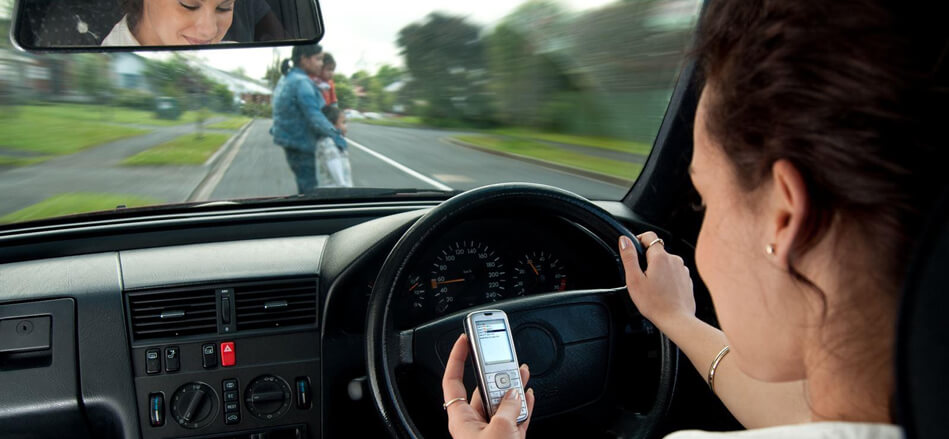Distracted Driving Accident Attorney

Multitasking has become a regular activity for many drivers in today’s hectic world. Driving while occupied with other distractions has become a growing problem across many U.S. states. Over the last decade, the use of mobile devices like cell phones, navigation systems, and even tablets while driving has become a severe concern on our highways and interstate roads. Even talking on the phone or talking to other passengers can cause experienced drivers to become distracted, resulting in serious injuries or deadly vehicle accidents.
If you have sustained injuries in a car accident caused by a distracted driver, you may be eligible to file a personal injury claim to gain fair compensation. Additionally, if you have lost a loved one in a car crash, you may be able to make a wrongful death claim on their behalf. The Iowa distracted driving accident attorneys at Mueller, Schmidt, Mulholland & Cooling are well-versed with personal injury law and can discuss your case during a free initial consultation.
Hiring an Attorney to Help File a Personal Injury Claim or Lawsuit
It’s critical to respond swiftly in order to preserve the evidence. If you contact a skilled attorney as soon as possible after a crash, you will have a better chance of collecting this evidence before it is destroyed or lost.
An attorney can use the legal system to compel people and corporations to keep important data and evidence safe. You can lose the evidence you need to claim fair compensation from the distracted driver and their insurance company if you don’t get help in a timely fashion.
It might be challenging to navigate the insurance claim process or insurance company adjusters after a car accident. It may be difficult to show the insurance company that the other driver was distracted. You already have a lot to handle; concentrate on your recovery while an experienced attorney manages your case.
MSMC law office’s Iowa distracted driving attorneys can assist you by researching the accident scene, reading police reports, evaluating eyewitness testimonies, and reviewing other pieces of evidence that may prove the other driver used their mobile phone or were otherwise distracted.
What is Distracted Driving?
Distracted driving is defined as any activity that takes your attention away from the task of safe driving. Examples include talking on the phone, eating and drinking, conversing with passengers in your vehicle, playing with the radio, entertainment, navigation system, and most commonly, texting — anything that diverts your attention away from the task of safe driving is considered a distraction.
The most alarming distraction is texting. Using your phone to send or receive a text can take your eyes off the road for five or more seconds. According to the NHTSA, texting for 5 seconds is like driving the length of a football field with your eyes closed at 55 mph.
You cannot drive safely unless you are completely focused on the task at hand. Any activity that you do while driving, other than properly operating your vehicle, is a possible distraction and raises your chances of colliding.
Common Types of Distracted Driving
Distractions include anything that diverts your focus away from driving. Distracted driving includes sending a text message, conversing on the phone, using a navigation system, and eating while driving.
Any of these distractions could put you, your passengers, and other drivers in danger. Distracted driving is divided into three categories, according to the CDC: <>/a>
- Cognitive losing focus/taking your mind away from the activity of driving
- Manual removing your hands from the steering wheel for any amount of time
- Visual looking away from the roadway or completely taking your eyes off the road
There are many distractions that fit into the above categories. For example, if you start to daydream or think about the day you had and not focus on driving, you are mentally removing yourself from the task at hand, and therefore this can be classified as a distracted driving practice. Additionally, a more common form of distraction is manual, when you completely remove your hands to either apply makeup, change the radio station, grab something from the back seat or passenger seat of your car, whatever it may be, this is a dangerous distraction.
Finally, visual distractions can have the most severe implications. You should never remove your eyes from the road. However, this is becoming a more common practice due to cellphone use in cars. Texting and driving is the most common visual distraction.
Distracted Driving Laws in Iowa
Iowa’s distracted driving law became a law on July 1, 2017, which means that a law enforcement officer can pull over any driver who is texting (reading, writing, or sending) or using any other portable electronic device while driving, unless the vehicle is completely stopped and off the traveled portion of the road.
According to
Iowa law, electronic devices are not allowed to be used by drivers under the age of 18 unless the vehicle is stopped and off the traveled area of the road, or the gadget is permanently installed in the vehicle or operated through permanently installed equipment.
Drivers above the age of 18 are allowed to use mobile phones as a GPS navigation system and to hold phone conversations while driving. These are the only permitted cell phone activities.
A driver who uses a smartphone and causes the death of another person has demonstrated proof of reckless driving and might face a felony conviction that includes up to 10 years in jail and a fine of up to $10,000, commencing July 1, 2017.
Proving Negligence After a Distracted Driving Accident
Negligence is defined as the failure to exercise adequate caution when performing a task. In the context of driving, each motorist owes other drivers the responsibility of driving safely and responsibly, which includes adhering to all traffic laws. Every driver is expected to drive in a manner that is safe as defined by laws and the reasonable person standard. This obligation has no exceptions.
If this responsibility is breached, the negligent individual will be held accountable for any injury caused by that negligence. If a motorist’s negligence causes an accident, that driver is liable for any injuries caused to others and their property.
The negligent driver could be held liable for the victim’s medical bills, related medical expenses, out-of-pocket expenses, car repair, and non-economic damages such as pain and suffering. It is not enough to say that someone was distracted while driving and that this was the cause of the accident. To prove that the motorist who caused the accident was distracted, some type of evidence must be shown.
Evidence that can be useful to show a driver was distracted and therefore caused the accident includes:
- Police reports
- Eyewitness testimony
- Expert witness testimony
- Confession from the driver
It is important to collect all evidence possible at the scene in order to show that the other driver caused the accident.
- Medical expenses
- Medical bills
- Lost wages
- Car repair/replacement
- Past and future medical costs
- Pain and suffering (harder to prove)
In order to warrant your claim for damages, it is best that you seek immediate medical attention and keep a record of their notes and diagnosis. Tracking your injuries will allow you to get the fair compensation you are owed. Injuries that one can sustain after a car accident include:
- Neck injuries
- Head injuries
- Brain injuries
- Whiplash
- Broken bones
- Burns
- Internal organ damage
- Broken bones and torn ligaments
There are many serious injuries that one can incur after an accident. You should always put your health and safety first.
Distracted Driving Statistics Iowa
In Iowa, cell phone distractions resulted in 945 auto accidents in the latest
reporting year, according to the Iowa Department of Transportation. There were four fatalities and 439 injuries in these distracted driving accidents. People who use portable gadgets while driving are four times more likely than those who do not to be involved in a serious accident.
According to the NHTSA, there were a total of 3,142 deaths in the United States that were attributed to distracted driving. Most, if not all distracted driving accidents could have been avoided if drivers put down the distractions and kept their eyes on the road.
Contact the Iowa Personal Injury Attorneys at Mueller, Schmidt, Mulholland & Cooling
The personal injury attorneys at Mueller, Schmidt, Mulholland & Cooling are committed to assisting anyone who has been injured in a distracted driving accident.
After a car accident involving a negligent or distracted driver, it is imperative that you speak with an des moines car accident lawyer as soon as possible. Personal injury cases generally have a statute of limitation of two years to file a claim. If you or a loved one has been injured, contact us today to discuss your case and obtain proper legal advice through a free consultation with one of our experienced attorneys, we may be able to file a personal injury case or a wrongful death claim based on the situation. You can reach us online or by phone at (515) 444-4000 Our offices are located in Des Moines, Iowa.








